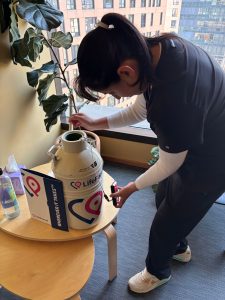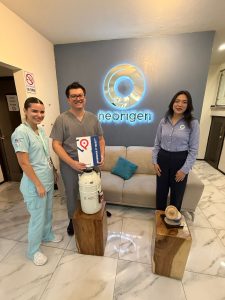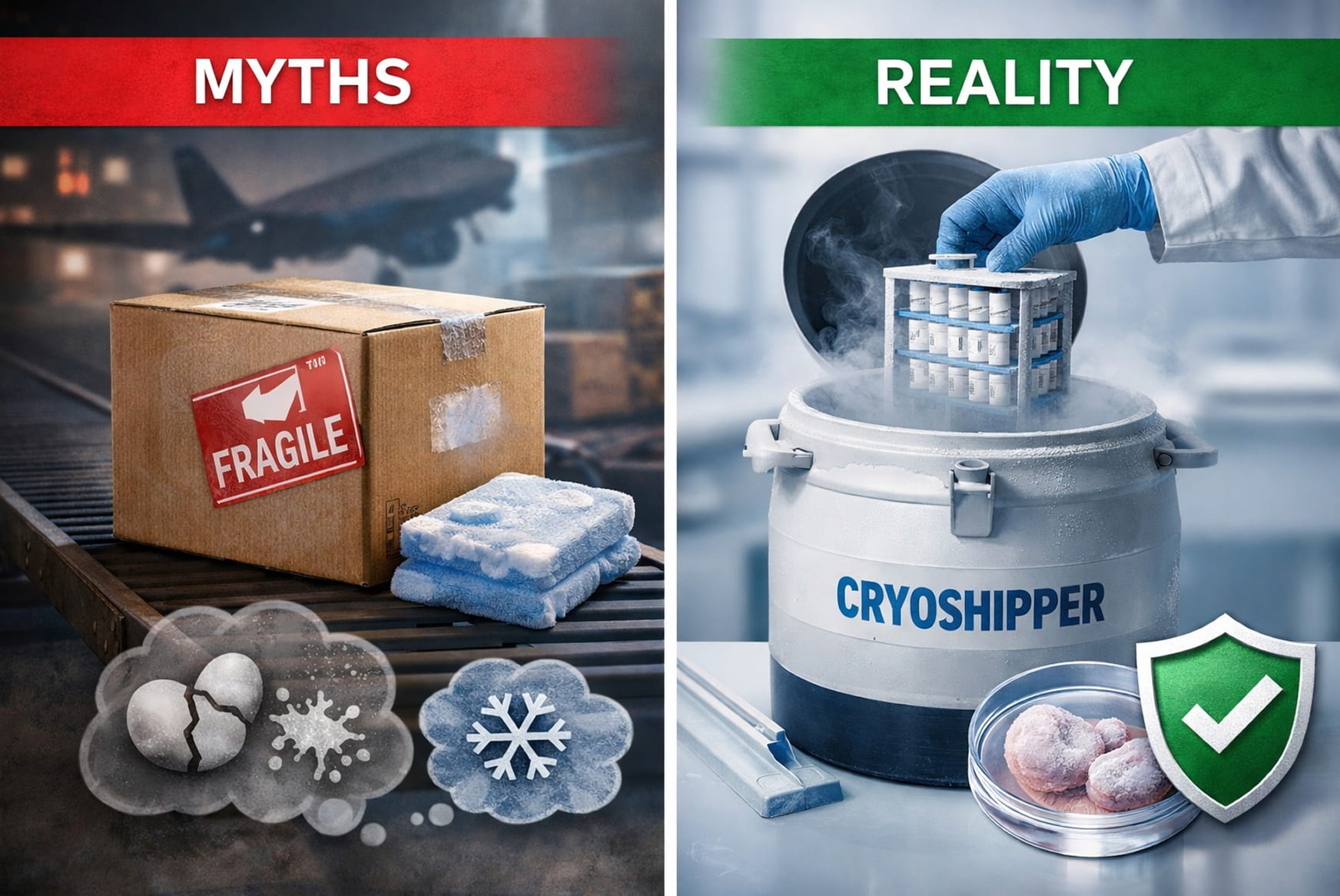When your fertility journey takes you across international borders, the safe transport of your embryos, eggs, or sperm becomes a critical piece of your treatment puzzle.
The world of fertility care has expanded far beyond major medical centers in developed countries. Today, patients are finding excellent treatment options in other destinations, from cutting-edge clinics in Eastern Europe to specialized facilities in Latin America and Asia. This global expansion of fertility care has made reliable international IVF transport more important than ever.
Your specimens represent years of hope, medical intervention, and financial investment. When they need to cross oceans and borders to reach their destination, you want assurance that they’ll arrive safely, on time, and in perfect condition.
The growing need for global fertility transport
International IVF transport has become essential as more couples explore treatment options beyond their home countries. The reasons vary—some seek specific medical expertise, others are drawn to more affordable care, and many are simply living internationally and want their specimens closer to home.
Expanding treatment options
Fertility clinics worldwide have dramatically improved their capabilities over the past decade. Patients from North America and Western Europe are increasingly considering treatment in countries like Spain, Czech Republic, Greece, and Mexico, where excellent care is available at more accessible prices.
Relocation
Similarly, expatriate communities in Asia, the Middle East, and Africa often need their frozen specimens transported from their home countries to clinics near their current residence. This global mobility has created a growing demand for reliable international IVF transport services that can navigate complex logistics while maintaining specimen safety.
Quality care in unexpected places
Some of the world’s most innovative fertility treatments are now available in locations that might not immediately come to mind. Countries like Turkey, Thailand, and Argentina have developed world-class fertility programs that attract international patients seeking specific treatments or expertise.
For couples considering these options, international IVF transport becomes the bridge between where their specimens are stored and where they want to receive treatment. The logistics might seem daunting, but professional transport services make these connections possible and safe.
Understanding the complexities of cross-border transport
International IVF transport involves challenges that domestic shipping simply doesn’t face. Each country has its own regulations for biological materials, customs procedures vary widely, and logistical infrastructure differs dramatically between regions.
Regulatory maze navigation
Every country handles the import of biological materials differently. Some require extensive pre-approval processes, others demand specific testing documentation, and many have restrictions on who can handle these materials once they arrive. Understanding these requirements and ensuring compliance is crucial for successful international IVF transport.
The documentation alone can be overwhelming—health certificates, import permits, chain of custody forms, and temperature records are just the beginning. Missing or incorrect paperwork can result in customs delays that compromise specimen viability, making expertise in international regulations invaluable.
Infrastructure realities
Not every destination has the infrastructure that we take for granted in major metropolitan areas. Some regions have limited airport facilities, unreliable cold chain capabilities, or customs offices that operate on schedules that don’t align with optimal specimen transport timelines.
Professional international IVF transport services must plan around these realities, building in contingencies for delays, identifying alternative routes when primary options aren’t available, and establishing relationships with local partners who understand the unique requirements of fertility materials.
How professional services navigate global challenges
Successful international IVF transport requires more than just putting specimens in a shipping container and hoping for the best. It demands expertise, planning, and the kind of problem-solving abilities that come from years of experience with global logistics.
Custom route planning
Every international IVF transport mission is unique, requiring customized planning based on origin, destination, specimen type, timing requirements, and local conditions. Our team at LifeParcel analyzes each route carefully, considering factors like flight schedules, customs procedures, local holidays, and even seasonal weather patterns that might affect transport.
This planning process often reveals that the most direct route isn’t necessarily the best route. Sometimes a connection through a third country provides better temperature control options, more reliable customs processing, or superior handling facilities. Experience with international IVF transport helps identify these optimal pathways.
Relationship building
Successful international IVF transport relies heavily on relationships with customs officials, local couriers, and clinic staff in destination countries. These relationships, built over years of consistent professional service, can make the difference between smooth delivery and costly delays.
When complications arise—and they inevitably do in international transport—having established contacts who understand your business and trust your professionalism becomes invaluable. A customs official who knows your courier and understands the urgency of fertility materials is more likely to prioritize processing when time is critical.
Technology integration
Modern international IVF transport leverages technology to maintain visibility and control throughout the journey. Real-time GPS tracking shows exactly where specimens are at any moment, while continuous temperature monitoring provides immediate alerts if storage conditions deviate from optimal ranges.
This technology becomes particularly valuable during international transport, where time zones and communication barriers might otherwise create information gaps. Clients can monitor their specimens’ progress online, while transport teams can respond immediately to any anomalies or challenges that arise.
Specialized equipment for extended journeys
International IVF transport often involves longer transit times than domestic shipping, making advanced cryogenic equipment essential for maintaining specimen viability. Professional services use dry shippers specifically designed for extended transport, with nitrogen hold times that exceed typical journey durations by comfortable margins.
Advanced cryogenic systems
LifeParcel’s international IVF transport equipment maintains temperatures of -196°C for up to 21 days, well beyond the duration of even the most complex international journeys. These systems undergo rigorous testing before each use and include backup monitoring systems that provide redundant protection for your specimens.
The dry shippers used for international transport are also designed to withstand the handling stresses of multiple flights, customs inspections, and varied transportation modes. They’re built to protect specimens not just from temperature fluctuations, but from physical impacts and environmental challenges that longer journeys might present.

Monitoring and documentation
International IVF transport requires comprehensive documentation of transport conditions from pickup to delivery. Temperature logs, handling records, and custody documentation provide complete accountability and help receiving clinics verify that specimens arrived in optimal condition.
This documentation becomes particularly important for international transport, where regulatory requirements may demand detailed records of transport conditions. Having complete, professional documentation eliminates questions and helps ensure smooth clearance through customs and regulatory checkpoints.
Working with international clinics
Successful international IVF transport requires close coordination with both sending and receiving clinics. Each facility has its own procedures, timing requirements, and handling protocols that must be understood and accommodated.
Pre-transport coordination
Before any international IVF transport begins, professional services coordinate extensively with both clinics to ensure alignment on timing, documentation, and handling requirements. This coordination helps prevent misunderstandings that could delay transport or compromise specimen safety.
LifeParcel’s team works directly with embryologists and clinic staff to understand specific requirements for each transport. Some specimens need special handling protocols, others have specific timing windows, and many require coordination with patient treatment schedules that cannot be easily adjusted.
Cultural and language considerations
International IVF transport often involves working across language barriers and cultural differences that can complicate communication and coordination. Professional services employ multilingual staff and develop cultural competencies that help ensure clear communication with partners worldwide.
Understanding local business practices, holiday schedules, and communication preferences helps prevent misunderstandings and builds the trust necessary for successful long-term partnerships. When your specimens are traveling internationally, having couriers who can communicate effectively with local partners provides additional security and confidence.

The LifeParcel advantage in global transport
LifeParcel’s approach to international IVF transport combines extensive experience with personalized service that recognizes the unique challenges and anxieties that come with shipping specimens across international borders.
Proven global experience: With successful transports across 32 countries and experience in diverse regulatory environments, LifeParcel has developed the expertise and relationships necessary for reliable international IVF transport. This experience translates into smoother processes, fewer delays, and greater confidence for clients whose specimens are traveling internationally.
Embryologist-led understanding: Having an experienced embryologist leading operations provides unique advantages for international IVF transport. Dr. Aharon Peretz understands not just the logistics of specimen transport, but the medical implications of timing delays, temperature fluctuations, and handling stresses that longer journeys might involve.
This medical understanding informs decision-making throughout the transport process, from equipment selection to route planning to problem-solving when unexpected challenges arise. Clients benefit from expertise that considers both logistical efficiency and medical necessity.
Your global partner in fertility care
International IVF transport requires expertise, experience, and the kind of personal commitment that recognizes the hopes and dreams represented by each specimen that crosses international borders. When your fertility journey takes you around the world, having the right transport partner makes all the difference.
LifeParcel’s commitment to international IVF transport excellence reflects our understanding that excellent fertility care should be accessible regardless of geography.
Want to find out more? Get in touch by requesting a quote or calling us at +1-866-370-6577.





